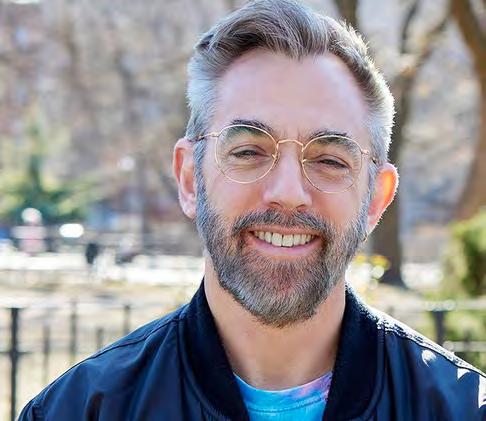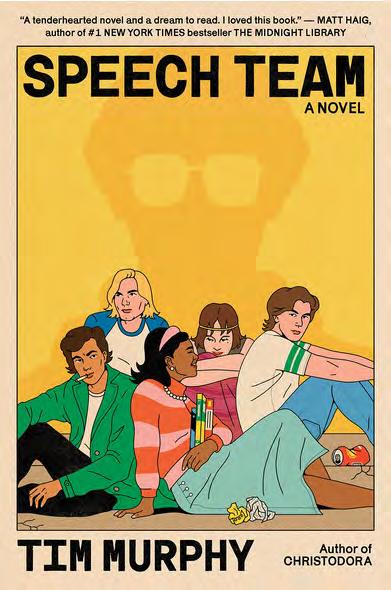
4 minute read
Tim Murphy’s ‘Speech Team’
by Gregg Shapiro
If you have loved gay writer Tim Murphy’s books since his breathtaking 2016 breakthrough novel “Christadora” and its 2019 follow-up “Correspondents,” then you will be happy to know that his fourth novel, “Speech Team” (Viking, 2023) is being released in August.
A powerful story about the consequences of words and a quest for restorative justice, “Speech Team” follows four high school classmates who reunite more than 20 years after graduation following the suicide of a fellow speech team member.
Gregg Shapiro: Tim, if you don’t mind, I’d like to begin with the most obvious question. Did you compete on a high school speech team?
Tim Murphy: Oh my God, yes [laughs]! It was everything to me – it was a portal into literature and politics and journalism and poetry and drama and oratory and so much more. And it was a big collection of weirdo brainiacs, queers, and nerds who competed, both in our high school and other schools in Massachusetts and beyond.
You would stand up before a room of people with your little folder, unless you were doing oratory in which you had to memorize your speech, and do your little presentation, often in the most prissy, mannered, overrehearsed way, and it was just so much fun and so, so gay; one of my best memories of high school along with theater and lit magazine and newspaper and all those other nerdy queer brainy high school pursuits.
In the first chapter, you ask the question that sets the tone for the rest of the book, which is, “Do you think people remember the things they said or did to people that stayed with them their whole lives?”
Well, you’re right, that is setting up the question that drives most of the book. But it is something I think about so much. What is said to Tip by Mr. Gold in the novel was said to me when I was 15 by a teacher. Did that teacher ever think about it again? What would they say or think if they knew I’d never forgotten it?
A few occasions when someone reminded me of something really cutting I’d said to them a long time ago that I’d forgotten, I was shocked, so full of remorse and shame. All you can say is “I am so sorry I said that.” I think that’s all the characters in the book are looking for. And they understand that it is about more than just Mr. Gold having said it – it was that he, an adult, so incisively hit the nerve of a kind of ambient teasing or abuse or commentary they absorbed every day for being so obviously gay, or Black in a white town, or odd and unsociable in a way we would now call neurodivergent.
There is a distinctive shift in tone/voice at the beginning of chapter three in which you write about Tip being a teenager, being queer, and being bullied, during the 1980s, which was an especially difficult time for gay teens. Please say something about the progress, if we can call it that, which has been made following the 1980s, into the early 2010s (when part of the novel is set) to the present day.

My first novel, “Getting Off Clean,” came out in 1997, a decade after I’d graduated high school, and the newly formed gay/straight alliance in the school reached out and asked if I’d come speak to them. I, for my life, could not believe such a group existed – I literally could not fathom it. And I did not go because I was so traumatized by memories of those hallways, and I feel so badly about that to this day.
Obviously, we all know, a huge shift started happening in the ’90s, and it probably started happening first in places like Massachusetts, which were soft ground for letting go of homophobia because evangelical Christianity is not really a big thing in New England.
Bill Weld in the ’90s was one of the first state governors to actually make LGBTQ students and anti-bullying programs a thing in public schools.
And now we are in this dark time of watching an enormous backlash to all that progress happen in about half of states, with trans and nonbinary kids taking the brunt. It is very infuriating and heartbreaking and I am always so blown away by the courage of the queer kids who stand up in those states and speak their truth in the face of cynical right-wing lawmakers who use legislation denying their existence as campaign fodder. I think the kids will prevail and we should support them in any way we can.

Sobriety and substance abuse also figure prominently in “Speech Team.” Please say something about that. I have such a history with both.
And I would say I’ve landed finally realizing that 12-step total sobriety from all substances including pot is not for me, although I derived a great deal from that approach for many years and it connected me to some of the dearest friends in my life to this day. But I don’t want it and can’t sustain it, just personally speaking. I’ve learned I’ve had to take a new route of ruthless self-examination and almost of tracking my own subconscious mind in terms of what direction I’m pointed toward. Speaking strictly for myself, it feels more honest. This is such a complex topic.
“Speech Team,” like recent novels by Rebecca Makkai (“I Have Some Questions For You”) and Kevin Wilson (“Now Is Not The Time To Panic”), is about friends revisiting a traumatic event from their formative teen years. This feels like a trend to me. Why do you think it is occurring now?
Yeah, there is definitely this thing happening in literature of I would generally say Gen X or older millennial writers revisiting past events. Honestly, I think it is about how younger people have used social media to really bring this idea of trauma, in all its sizes, to the fore, putting words to something that has always existed without language to work through, centering it as a thing to be talked about and processed, sometimes almost to an extreme degree. www.penguinrandomhouse.com www.instagram.com/timmurphynycwriter
I think these younger people have woken my generation up to all these things we experienced we thought we just had to push down and forget about and move on, and it’s producing interesting work. It’s about how mores of what is and is not acceptable are constantly changing, and how old ideas of “That’s no big deal, get over it” get interrogated and revised. Have you started working on or thinking about your next book project?
I have actually finished the first draft of a new novel, which currently is one big fat lump [laughs]! And I am happy to report it is not set remotely in Mendhem, Mass., or a place like it –well, except for one smallish flashback part that may well end up on the cutting room floor anyway.
Read the full interview on www.ebar.com.









